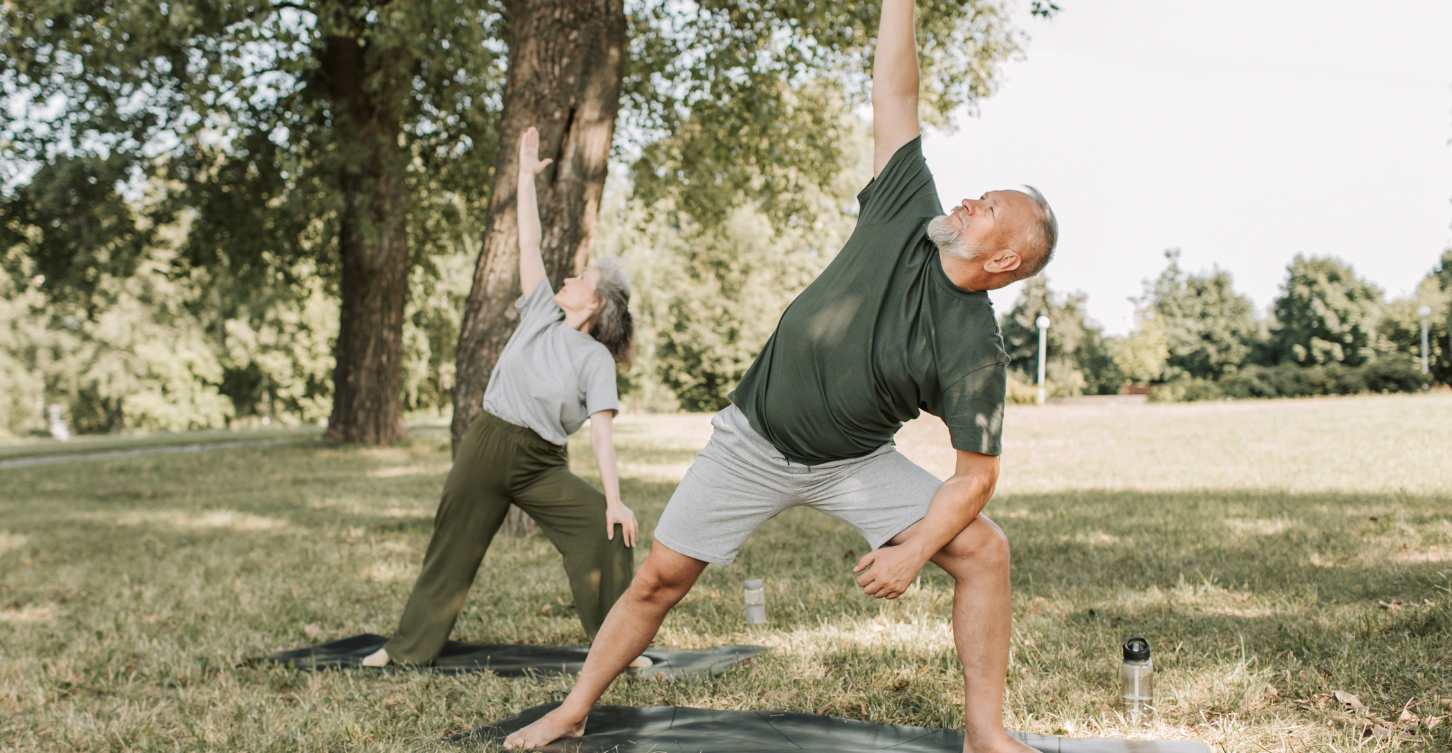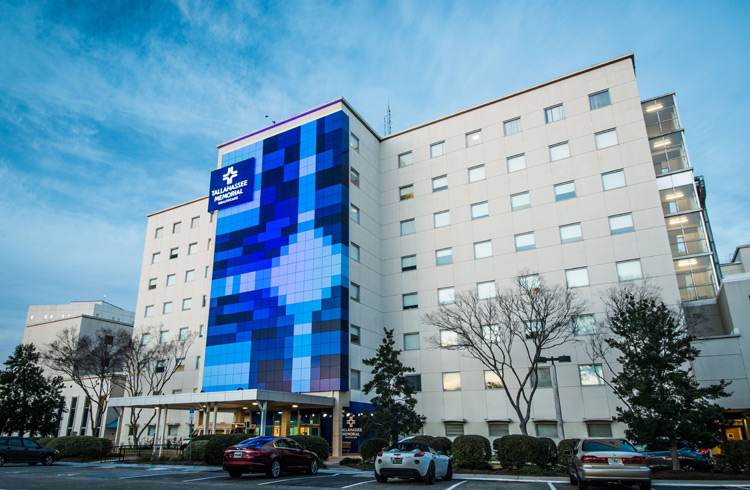Healthy Aging After 50 — How to Stay Active, Strong, and Mentally Sharp
October 30, 2025
By: Tallahassee Memorial HealthCare
Categories: Healthy Living
Reaching mid-life doesn’t have to be a crisis. Your 50s and above can be an exciting, active part of life when you prioritize your health.
Getting older requires you to have more consideration when it comes to your mind and body. Taking appropriate measures in your 50s can allow you to live out your later years free from chronic pain and illness.
Check out some of the steps you can take to strengthen your health confidence below.
Strength Training and Mobility Importance for Adults Over 50
Daily movement is the key to ensuring your ability to move freely for longer. Implementing strength training and mobility exercises are a great addition to your routine for your body and mind.
When you age, lean muscle mass naturally diminishes, so it is important to build muscle to ensure you can continue moving throughout your daily life.
Benefits of strength training include:
- Increasing bone density
- Managing weight
- Completing daily tasks more easily
- Protecting your joints
- Reducing symptoms of chronic conditions
- Improving cognitive abilities
- Stimulating the release of endorphins, improving your mood
You can practice strength training both at home and in the gym using your body weight, free weights, resistance bands or weight machines. If you are starting your fitness journey, talk to your physician to develop a plan.
Mobility exercises target your joints. Maintaining joint health is crucial to continue be able to move regularly. Total body mobility focuses on preserving your ability to move your body as an entire unit.
This normally occurs as a combination of stability and flexibility exercises, which can have many benefits, like improving general balance.
Nutrition to Support Healthy Aging
Nutrition plays a part in the health of both your physical and mental state.
You may need to tailor your food choices for a specific health condition, like hypertension or diabetes. In general, to maintain your bone health, muscle mass and energy levels, focus on finding these components in your diet:
- Protein: This can come in the form of a variety of meats like poultry and fish. Eggs, beans, tofu, nuts and seeds are also known to be high in protein.
- Fiber: Foods high in fiber include a number of fruits including raspberries, pears, apples, bananas, oranges and strawberries. Vegetables like peas, broccoli, turnips, brussels sprouts, potatoes, corn, cauliflower and carrots can also contribute. Grains such as whole-wheat spaghetti, quinoa, brown rice and bran flakes as well as legumes, nuts and seeds are important as well.
- Unsaturated fats: Some sources of monounsaturated and polyunsaturated fats are vegetable oils, nuts, seeds, avocados and fish such as salmon, tuna and mackerel.
- Whole grains: Good sources of whole grains are brown rice, corn, popcorn, oats, quinoa, rye, barely and whole wheat products.
- Vitamins D and B: Vitamin D can be acquired through salmon, tuna, eggs, dairy and cereals. Foods high in vitamin B complexes like B6, B9 and B12 are whole grains, asparagus, spinach, broccoli, orange juice, bananas, eggs, meat, milk, cheese, tofu and legumes.
Foods to limit are ones that contain saturated fat and added sugars. These can contribute to increased tiredness and, if consumed regularly, can cause you to develop chronic illnesses, like diabetes or hypertension.
How can Seniors Prevent Falls at Home?
Aging and health changes can greatly affect your balance. It is important to take measures to prevent falls, as they can result in serious injury.
Strength training and mobility play a large part in preventing falls, as practicing balance is the key to perfecting it.
Easy changes you can make to prevent falls include:
- Wearing fitted, sturdy, flat and nonskid shoes
- Clear your floor from potential trip hazards like boxes, electrical cords, magazine racks, plant stands and coffee tables
- Secure loose rugs, mats, carpeting and floorboards
- Use nonslip mats and bath seats in your shower and bathroom
- Implement railings in places harder to walk like the shower or staircase
- Store necessities like clothes, food and appliances in easy-to-reach places
- Keep your home brightly lit when walking
Talk to your healthcare provider about your medications, medical history and potential previous falls to come up with solutions specific to you.
Ways to Promote Bone Health
Monitoring your bone health is important as you age, as your bone density naturally decreases over time. Bone remodeling – the act of your body forming new bone and breaking down old bone – peaks at age 30. After this period, your body breaks down slightly more bone than it reproduces.
Women are at a higher risk for osteoporosis, a chronic condition characterized by fragile bones, as bone brittleness can increase due to hormone changes during menopause. This does not exempt men from the disease, but it is important to factor in sex when evaluating your risk factors. Medications that affect your hormones can also increase your risk.
To keep your bones healthy, nutrition is essential to consider. Prioritize calcium and vitamin D in your diet. Avoid tobacco and alcohol. For women, having more than one alcoholic drink and for men, two drinks, can increase the risk of osteoporosis.
A well-rounded diet is important, as those with a body mass index of 19 or less, or have a smaller body frame, are more prone to bone fragility.
Genetics factor into osteoporosis risk as well. Those with a family history, as well as Caucasian and Asian people, have a higher likelihood of developing the condition.
Exercising, especially with weight-bearing exercises, can help you build stronger bones and slow bone loss.
To find an orthopedic specialist, visit our Find a Doctor page.
Staying Mentally Sharp As You Age
Keeping up with your physical health is important as you age, but your mental health should receive attention as well.
Exercising regularly and keeping your body moving—even through household chores—has a positive effect on your mind by maintaining memory muscles and boosting serotonin.
Some medical conditions can affect your brain’s ability to perform, including:
- High blood pressure
- Heart disease
- Stroke
- Diabetes
Managing these conditions, as well as other chronic or temporary physical illnesses, is important for your mental health. Taking the steps to treat these issues will help your state of mind improve by consequence.
Ways to keep your mind working:
- Engage in hobbies that bring you mental stimulation and joy.
- Creative activities such as music, dance, and writing are shown to help maintain cognitive function.
- Regularly interact with family and friends, as well as your community like neighborhoods or organizations to maintain your social skills.
- Consider joining a club or volunteering if you’re looking for added social engagement.
TMH offers a wide variety of volunteer opportunities for seniors, including work in our Animal Therapy department, assisting patients throughout the hospital and cuddling babies in the neonatal intensive care unit (NICU).
Being open about your mental state is also important. Mental illnesses like depression, anxiety, and other disorders are prevalent, and shying away from treatment can diminish your quality of life.
You can find help today by working with one of our professional physicians at the Live Oak Behavioral Health Center or with our partners at Apalachee Center.
Aging With Confidence
Growing older doesn’t have to mean slowing down. By prioritizing mobility, nutrition, fall prevention, bone health and cognitive health, you can live out your later years as an active, healthy senior. If you need help getting started a plan custom to you, schedule an appointment with your Primary Care provider today.

